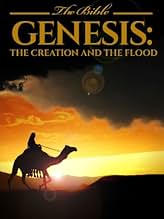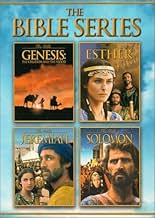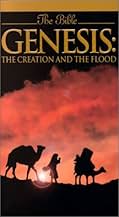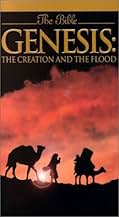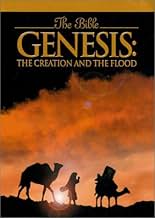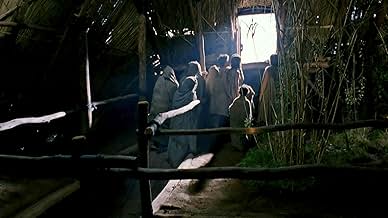NOTE IMDb
5,5/10
840
MA NOTE
C'est d'abord à travers le regard d'un enfant que nous découvrons la merveille de la Création. La nature, la vie, le monde en son premier jour. Puis, viendront Adam et Eve, Cain et Abel, Noé... Tout lireC'est d'abord à travers le regard d'un enfant que nous découvrons la merveille de la Création. La nature, la vie, le monde en son premier jour. Puis, viendront Adam et Eve, Cain et Abel, Noé et le Déluge.C'est d'abord à travers le regard d'un enfant que nous découvrons la merveille de la Création. La nature, la vie, le monde en son premier jour. Puis, viendront Adam et Eve, Cain et Abel, Noé et le Déluge.
- Réalisation
- Scénario
- Casting principal
- Récompenses
- 1 nomination au total
Avis à la une
My father rented "The Bible Collection" DVDs over the Easter period, but I was interested in watching only two of these and that was only because of who directed them - this one by Italian film-maker Olmi and the already-reviewed SAMSON AND DELILAH (1996) by Nicolas Roeg.
Of course, as Roeg's film obviously elicited largely unfavorable comparisons to Cecil B. De Mille's 1949 spectacular, so too does this one to John Huston's notorious 1966 biblical flop. Still, much as that film proved a disappointment, its undeniable grandeur is vastly preferable to the ordinariness and quasi-documentary style of Olmi's effort (the star cast Huston assembled certainly didn't hurt - whereas here only Italian actor Omero Antonutti is recognizable at all, as the rest of the cast is comprised of non-professional Moroccans)!
To be fair to Olmi, he handles the events with some imagination - as they're presented in the form of campfire tales narrated by nomad Antonutti (who also takes on the role of Noah) to his people - and the images (accentuated by Ennio Morricone's wistful score) are often poetic...but the over-familiarity of it all and the distinct lack of excitement displayed throughout results in sheer dullness! Thankfully, the film is only around an hour and a half in length - whereas most of the other titles in "The Bible Collection" ran for something like twice that running-time (as does, after all, John Huston's THE BIBLE - IN THE BEGINNING itself). One other asset to the film, at least in its English-dubbed version I watched, is the melodious voice of Paul Scofield (who dubs Antonutti throughout).
Of course, as Roeg's film obviously elicited largely unfavorable comparisons to Cecil B. De Mille's 1949 spectacular, so too does this one to John Huston's notorious 1966 biblical flop. Still, much as that film proved a disappointment, its undeniable grandeur is vastly preferable to the ordinariness and quasi-documentary style of Olmi's effort (the star cast Huston assembled certainly didn't hurt - whereas here only Italian actor Omero Antonutti is recognizable at all, as the rest of the cast is comprised of non-professional Moroccans)!
To be fair to Olmi, he handles the events with some imagination - as they're presented in the form of campfire tales narrated by nomad Antonutti (who also takes on the role of Noah) to his people - and the images (accentuated by Ennio Morricone's wistful score) are often poetic...but the over-familiarity of it all and the distinct lack of excitement displayed throughout results in sheer dullness! Thankfully, the film is only around an hour and a half in length - whereas most of the other titles in "The Bible Collection" ran for something like twice that running-time (as does, after all, John Huston's THE BIBLE - IN THE BEGINNING itself). One other asset to the film, at least in its English-dubbed version I watched, is the melodious voice of Paul Scofield (who dubs Antonutti throughout).
I was very moved by the images in this lyric evocation of the Book of Genesis by the great Italian director Ermanno Olmi, whose TREE OF WOODEN CLOGS is one of my favorite films of all time.
Through a series of painterly images, and the calming, soothing narration of Omero Antonutti (Paul Scofield in the English version,) we are hand-led from the creation of man (in simple, elemental, but effective brush-strokes) to the fall of man, to what constitutes the longest segment of the film, Noah's construction of the ark, and the first of mankind's redemptions. Omero Antonutti plays the old man, the prophet-vessel of God himself as his boat is the vessel of a new humanity. The loading of the animals, the sense among Noah's extended family during the voyage that they are part of something greater than themselves, the dove at Ararat with the olive branch in its mouth, the vista of a subsiding ocean, all create, with the simplest of means, an impression that can be sublimely moving. And we ask ourselves why. What special gift can make a film director convert images, words, and sounds into the sacramental?
The music and musical selections by Ennio Morricone (with a great deal of Bulgarian women's chants incorporated) create a haunting impression as well. One does not have to be a great believer or even a believer at all, to be swayed by this work of wondrous poetry.
Through a series of painterly images, and the calming, soothing narration of Omero Antonutti (Paul Scofield in the English version,) we are hand-led from the creation of man (in simple, elemental, but effective brush-strokes) to the fall of man, to what constitutes the longest segment of the film, Noah's construction of the ark, and the first of mankind's redemptions. Omero Antonutti plays the old man, the prophet-vessel of God himself as his boat is the vessel of a new humanity. The loading of the animals, the sense among Noah's extended family during the voyage that they are part of something greater than themselves, the dove at Ararat with the olive branch in its mouth, the vista of a subsiding ocean, all create, with the simplest of means, an impression that can be sublimely moving. And we ask ourselves why. What special gift can make a film director convert images, words, and sounds into the sacramental?
The music and musical selections by Ennio Morricone (with a great deal of Bulgarian women's chants incorporated) create a haunting impression as well. One does not have to be a great believer or even a believer at all, to be swayed by this work of wondrous poetry.
Am ambitious adaptation of the first book of the Bible, taking us up to the time of Noah, GENESIS: THE CREATION AND THE FLOOD is a film that's beautiful to watch. The film was shot in Morocco employing a cast of mostly locals, and it looks absolutely stunning: if you ever wanted to see a film that displays the inherent beauty of nature, then this is the one. It took my breath away in places.
As a Biblical adaptation, it has its work cut out. GENESIS lacks a single leading character so this film adopts a voice over (by Paul Scofield) to intone much of the story involving Adam and Eve, Cain and Abel, and Noah. It's all simple and straightforward, with admittedly powerful scenes (inserting modern-day conflict into one section is a genius idea) but it's also very slow and long-winded despite a running time of only an hour and a half.
The lack of a decent budget is also apparent - we never really see the flood despite the lengthy section telling Noah's story - but that doesn't really matter given the calibre of Ermanno Olmi's direction. This is a worthy adaptation, but not really a film you'd want to go back to.
As a Biblical adaptation, it has its work cut out. GENESIS lacks a single leading character so this film adopts a voice over (by Paul Scofield) to intone much of the story involving Adam and Eve, Cain and Abel, and Noah. It's all simple and straightforward, with admittedly powerful scenes (inserting modern-day conflict into one section is a genius idea) but it's also very slow and long-winded despite a running time of only an hour and a half.
The lack of a decent budget is also apparent - we never really see the flood despite the lengthy section telling Noah's story - but that doesn't really matter given the calibre of Ermanno Olmi's direction. This is a worthy adaptation, but not really a film you'd want to go back to.
The Bible stories of modern times (pretty much since 1970) have tended to be extreme one way or the other.
The trouble is that one extreme tries to make the Bible a depressing bit of racist Nazi propaganda, while the other extreme makes it "Mickey Mouse".
This goes into the Mickey Mouse extreme, but it isn't pretentious about it. It's quite obviously made for kids, and there is no attempt to make it otherwise. That's a bit of a saving grace.
The trouble is that one extreme tries to make the Bible a depressing bit of racist Nazi propaganda, while the other extreme makes it "Mickey Mouse".
This goes into the Mickey Mouse extreme, but it isn't pretentious about it. It's quite obviously made for kids, and there is no attempt to make it otherwise. That's a bit of a saving grace.
"Genesis: The Creation and the Flood" is a good film if you want someone to read the Bible to you. It is 98% narrated by the British actor Paul Scofield. The actors rarely speak.
This film covers a period in the Bible that is difficult to dramatise. There are so many characters in bloodline between the creation of man and the birth of Noah that you can't pick a main protagonist. The film makers could have dealt with this in two ways:
OPTION 1 - Break this period down into three or four separate stories linked together by a narrator i.e 1)The Creation, 2) Adam & Eve 3)Cain & Able, 4) Noah
OPTION 2 - Use a narrator to read the Bible.
In this film they use a narrator to read the Bilble and it seems as if he is reading the Bible almost word for word. The "actors" rarely speak. I'm not even sure if they are actors as their faces rarely convey any emotion. The actors from the silent movie period such as Charlie Chaplin were able to convey emotions without speaking. The actors in this film however just move from one scene to another with blank faces whilst the narrator reads from the Bible.
I gave this film 1/10 because the score by Ennio Morricone was soothing. The score was the only redeeming factor.
This film covers a period in the Bible that is difficult to dramatise. There are so many characters in bloodline between the creation of man and the birth of Noah that you can't pick a main protagonist. The film makers could have dealt with this in two ways:
OPTION 1 - Break this period down into three or four separate stories linked together by a narrator i.e 1)The Creation, 2) Adam & Eve 3)Cain & Able, 4) Noah
OPTION 2 - Use a narrator to read the Bible.
In this film they use a narrator to read the Bilble and it seems as if he is reading the Bible almost word for word. The "actors" rarely speak. I'm not even sure if they are actors as their faces rarely convey any emotion. The actors from the silent movie period such as Charlie Chaplin were able to convey emotions without speaking. The actors in this film however just move from one scene to another with blank faces whilst the narrator reads from the Bible.
I gave this film 1/10 because the score by Ennio Morricone was soothing. The score was the only redeeming factor.
Le saviez-vous
- AnecdotesThe film had its world premiere on September 6, 1994, out of competition at the Venice Film Festival.
- ConnexionsFollowed by Jacob (1994)
Meilleurs choix
Connectez-vous pour évaluer et suivre la liste de favoris afin de recevoir des recommandations personnalisées
- How long is Genesis: The Creation and the Flood?Alimenté par Alexa
Détails
- Date de sortie
- Pays d’origine
- Langues
- Aussi connu sous le nom de
- Genesis: The Creation and the Flood
- Lieux de tournage
- Sociétés de production
- Voir plus de crédits d'entreprise sur IMDbPro
Contribuer à cette page
Suggérer une modification ou ajouter du contenu manquant

